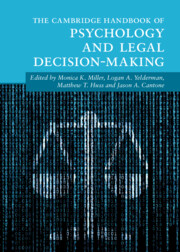Book contents
- The Cambridge Handbook of Psychology and Legal Decision-Making
- Cambridge Handbooks in Psychology
- The Cambridge Handbook of Psychology and Legal Decision-Making
- Copyright page
- Dedication
- Contents
- Figures
- Tables
- Editors
- Contributors
- Part I Introduction Chapters
- Part II Pretrial Phase Decision-Making
- Part III Trial Phase Decision-Making
- 20 Social Cognition of Jury Decision-Making
- 21 Beliefs About Juror Decision-Making and the Jury Process
- 22 Deciphering Directives
- 23 Decisions Surrounding the Use of Expert Testimony
- 24 Legal and Extralegal Factors that Affect Jurors’ Decisions
- 25 Decisions Regarding Insanity
- 26 Decision-Making in the Shadow of Evidence Law
- 27 Decision-Making in Contested Divorce Child Custody Cases
- Part IV Postconviction Phase Decisions
- Part V Other Legal Decision-Making
- Part VI Perspectives from the Field
- Part VII Conclusion
- Index
- References
23 - Decisions Surrounding the Use of Expert Testimony
from Part III - Trial Phase Decision-Making
Published online by Cambridge University Press: 22 February 2024
- The Cambridge Handbook of Psychology and Legal Decision-Making
- Cambridge Handbooks in Psychology
- The Cambridge Handbook of Psychology and Legal Decision-Making
- Copyright page
- Dedication
- Contents
- Figures
- Tables
- Editors
- Contributors
- Part I Introduction Chapters
- Part II Pretrial Phase Decision-Making
- Part III Trial Phase Decision-Making
- 20 Social Cognition of Jury Decision-Making
- 21 Beliefs About Juror Decision-Making and the Jury Process
- 22 Deciphering Directives
- 23 Decisions Surrounding the Use of Expert Testimony
- 24 Legal and Extralegal Factors that Affect Jurors’ Decisions
- 25 Decisions Regarding Insanity
- 26 Decision-Making in the Shadow of Evidence Law
- 27 Decision-Making in Contested Divorce Child Custody Cases
- Part IV Postconviction Phase Decisions
- Part V Other Legal Decision-Making
- Part VI Perspectives from the Field
- Part VII Conclusion
- Index
- References
Summary
The use of expert psychological testimony by the courts involves a series of decisions. The initial decision involves an attorney or judge seeking out an expert to provide testimony. The second set of decisions – usually made by the expert in consultation with the attorney – concerns whether the potential testimony will be helpful or harmful to the case. A third set of decisions – made by the judge in a specific case – concerns the admissibility and scope of expert testimony at trial. If the testimony is admitted at trial, a final decision involves how much or how little weight jurors give the expert testimony while arriving at a verdict. These decisions are strongly shaped by the adversarial system. Drawing on empirical research and their experiences as expert witnesses, the authors explore how these decisions are made. Relevant research is reviewed, particularly on the content and impact of expert psychological testimony. New directions for research are discussed.
- Type
- Chapter
- Information
- The Cambridge Handbook of Psychology and Legal Decision-Making , pp. 355 - 364Publisher: Cambridge University PressPrint publication year: 2024

